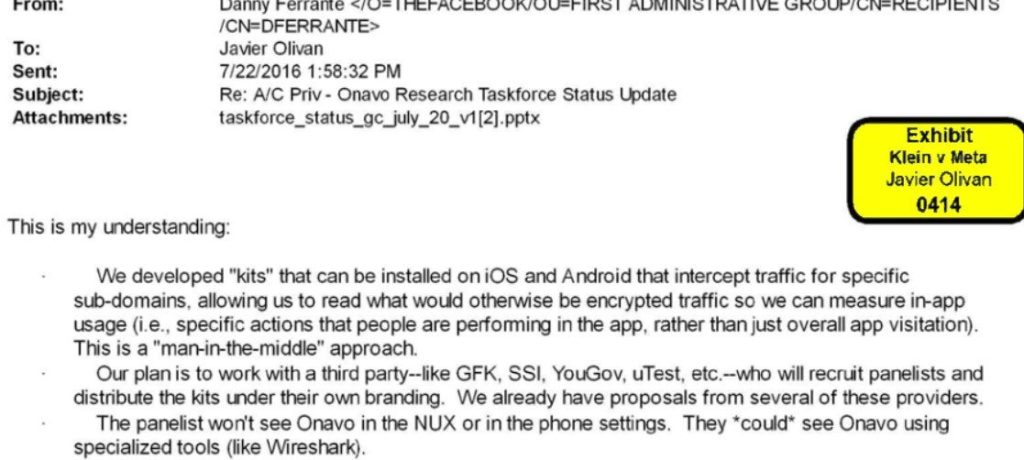In a recent revelation that has sent shockwaves through the tech community and beyond, Meta (formerly Facebook) has been accused of engaging in highly unethical behavior that not only breaches user trust but potentially flouts legal boundaries. According to Matthew Green, a respected cryptography professor at Johns Hopkins University, Meta conducted a man-in-the-middle (MITM) attack on its competitors, including Snapchat, through its Onavo VPN service. This operation allowed Meta to decrypt and analyze the TLS-secured traffic of its competitors, a tactic that can only be described as both “deeply messed up and evil.”
This incident is not a mere blip in the landscape of digital ethics; it signifies a monumental breach of trust and a cavalier disregard for privacy norms and potentially legal frameworks governing corporate behavior. The gravity of Meta’s actions cannot be understated, and it prompts a serious reconsideration of the extent to which big tech companies are willing to go in their pursuit of dominance.
A Red Line Crossed
The concept of a MITM attack is familiar within cybersecurity circles. It involves an attacker secretly relaying and possibly altering the communication between two parties who believe they are directly communicating with each other. In the context of digital privacy and security, such an action by a corporate entity against its competitors is alarming. It’s not just a breach of ethical standards; it potentially crosses into criminal territory.
Matthew Green’s commentary underscores a disillusionment with Meta’s ethical compass, suggesting that such a maneuver did not occur in a vacuum but likely had the tacit if not explicit, approval of the highest echelons within the company. This raises profound questions about the corporate governance and ethical guidelines governing Meta’s operations, suggesting that a culture of ‘win at all costs’ may permeate the company’s strategy.
The Irony of Digital Privacy Concerns
The revelation brings to light the often-dismissed concerns of non-technical users, who speculate about the extent of surveillance conducted by tech giants like Meta. While these companies have vehemently denied such accusations, the recent events lend credence to the fears that not everything is as transparent or ethical as it is portrayed. This breach of trust is not a simple matter to rectify; it necessitates not just internal scrutiny but potentially external intervention to ensure accountability.

Apple’s Stance Reconsidered
Interestingly, this incident casts Apple’s efforts to limit Meta’s reach on its platform in a different light. While Apple’s motives may not be entirely altruistic, recognizing the potential for Meta’s applications to act as vectors for unethical surveillance practices seems less far-fetched in this context. It highlights the ongoing battle for digital privacy and the role that platform owners like Apple can play in safeguarding user interests against entities that have shown a willingness to exploit their dominance in troubling ways.
Community Reaction
The conversation picks up with user Ali’s observation that Uber engaged in practices akin to Meta’s, noting that the transportation giant had its own contentious history with Lyft. What’s particularly striking here is the assertion that Apple’s App Tracking Transparency (ATT) feature, which allows users to opt out of being tracked across apps, significantly dented Facebook’s earnings.
There is a known, widespread and potentially systemic issue within the tech industry concerning user data and privacy. The underlying suspicion that these companies may still operate undisclosed monitoring programs only adds fuel to the public’s mistrust.
The Regulatory Hammer and Privacy Protection

Matthew Green adds context to this discussion by recalling Uber’s fall from grace, which culminated in significant leadership changes. This historical reference serves as a cautionary tale for Meta, emphasizing that unethical behavior can lead to dire consequences. Ali further articulates a common public sentiment: admiration for Apple’s aggressive stance on privacy, juxtaposed against a critique of Google’s Android platform, which is perceived as less robust in protecting user privacy.
There’s an increasing call for stringent oversight as individuals and society at large grapple with the implications of unchecked corporate power over personal data.
Bridging the Gap Between Expert Insights and Public Understanding
JesseClouds1’s plea for a “normie” translation encapsulates the need for clarity in discussing these technical issues. Matthew Green obliges, likening Meta’s VPN to a Trojan horse that, under the guise of security, intruded into competitors’ traffic. This simple but powerful analogy breaks down complex cyber surveillance practices into an easily digestible narrative.
The Broader Implications of Corporate Conduct
Brandon Rosado’s tweet underscores a sentiment of betrayal and frustration, touching on the broader issue of public trust. The mention of Snapchat’s “innovation theft” saga with Meta provides a nuanced perspective on corporate conduct that goes beyond privacy violations. It reflects a deep-seated concern over the moral fabric of tech giants and their relationship with innovation, competition, and respect for intellectual property.
The implications of Meta’s actions extend beyond the immediate backlash and calls for accountability. They touch upon the foundational elements of trust, privacy, and ethical conduct in the digital age. As we navigate the complexities of digital surveillance, corporate governance, and user rights, the conversation must evolve to address these challenges head-on, ensuring that technological advancements do not come at the expense of fundamental ethical principles.
The path forward requires not only rigorous scrutiny of tech giants like Meta but also a collective reevaluation of the standards we expect from those who wield significant power in the digital ecosystem.
Author Profile

- Ex-community moderator of the Banano memecoin. I have since been involved with numerous cryptocurrencies, NFT projects and DeFi organizations. I write about crypto mainly.
Latest entries
- June 6, 2025NewsWireElon Musk to Decommission SpaceX Dragon after Trump Threat
- December 9, 2024Stock MarketMaster the Time Value of Money Financial Concept
- November 18, 2024Stock MarketFinancial Ratios Guide to Measuring Business Performance
- November 11, 2024NewsWireLabour’s UK Budget: A Fiscal Smirk of Contempt for Working People






